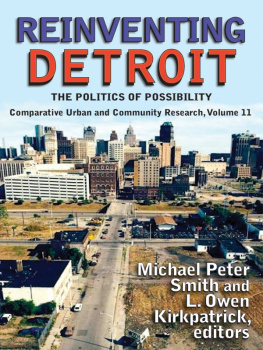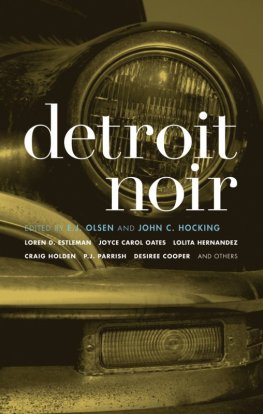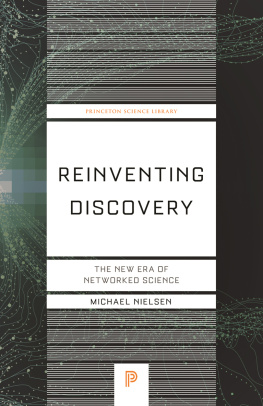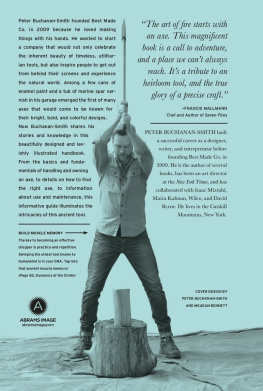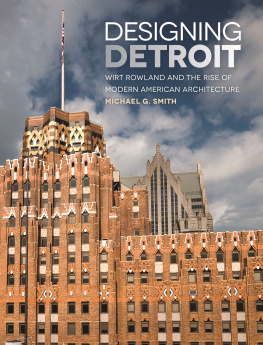Michael Peter Smith - Reinventing Detroit
Here you can read online Michael Peter Smith - Reinventing Detroit full text of the book (entire story) in english for free. Download pdf and epub, get meaning, cover and reviews about this ebook. year: 2015, publisher: Transaction Publishers, genre: Politics. Description of the work, (preface) as well as reviews are available. Best literature library LitArk.com created for fans of good reading and offers a wide selection of genres:
Romance novel
Science fiction
Adventure
Detective
Science
History
Home and family
Prose
Art
Politics
Computer
Non-fiction
Religion
Business
Children
Humor
Choose a favorite category and find really read worthwhile books. Enjoy immersion in the world of imagination, feel the emotions of the characters or learn something new for yourself, make an fascinating discovery.
- Book:Reinventing Detroit
- Author:
- Publisher:Transaction Publishers
- Genre:
- Year:2015
- Rating:4 / 5
- Favourites:Add to favourites
- Your mark:
- 80
- 1
- 2
- 3
- 4
- 5
Reinventing Detroit: summary, description and annotation
We offer to read an annotation, description, summary or preface (depends on what the author of the book "Reinventing Detroit" wrote himself). If you haven't found the necessary information about the book — write in the comments, we will try to find it.
Reinventing Detroit — read online for free the complete book (whole text) full work
Below is the text of the book, divided by pages. System saving the place of the last page read, allows you to conveniently read the book "Reinventing Detroit" online for free, without having to search again every time where you left off. Put a bookmark, and you can go to the page where you finished reading at any time.
Font size:
Interval:
Bookmark:
REINVENTING
DETROIT
Comparative Urban and Community Research Series
Michael Peter Smith, editor
The Comparative Urban and Community Research Series is devoted to cutting-edge theoretical and empirical research in the social sciences on processes of urbanization and community change throughout the world. The series focuses on the key driving forces of urban change, including economic and cultural globalization, transnational-ism in all of its forms, and the grassroots politics of place-making. Each volume in the series is focused on distinct themes such as the regional development of cities along the Pacific Rim, the politics of urban social movements, the global restructuring of city life, and the agency possible in marginalized urban spaces.
Titles in this series include:
Remaking Urban Citizenship
Transnational Ties
The Human Face of Global Mobility
City and Nation
Transnationalism from Below
Marginal Spaces
After Modernism
Breaking Chains
Pacific Rim Cities in the World Economy
Power, Community, and the City

Copyright 2015 by Transaction Publishers, New Brunswick, New Jersey.
All rights reserved under International and Pan-American Copyright Conventions. No part of this book may be reproduced or transmitted in any form or by any means, electronic or mechanical, including photocopy, recording, or any information storage and retrieval system, without prior permission in writing from the publisher. All inquiries should be addressed to Transaction Publishers, 10 Corporate Place South, Suite 102, Piscataway, New Jersey 08854. www.transactionpub.com
This book is printed on acid-free paper that meets the American National Standard for Permanence of Paper for Printed Library Materials.
Library of Congress Catalog Number: 2015006289
ISBN: 978-1-4128-5693-5
eBook: 978-1-4128-5660-7
Printed in the United States of America
Library of Congress Cataloging-in-Publication Data
Reinventing Detroit : the politics of possibility / Michael Peter Smith, L. Owen Kirkpatrick, editors.
pages cm. -- (Comparative urban and community research ; volume 11)
Includes bibliographical references and index.
ISBN 978-1-4128-5693-5 -- ISBN 978-1-4128-5660-7 1. Urban policy--Michigan--Detroit. 2. Urban renewal--Michigan--Detroit. 3. Shrinking cities--Michigan--Detroit. 4. Municipal government--Michigan--Detroit. 5. Municipal finance--Michigan--Detroit. 6. Detroit (Mich.)--Economic conditions--21st century. I. Smith, Michael P., editor. II. Kirkpatrick, L. Owen, editor.
HT168.D45R45 2015
307.34160977434--dc23
2015006289
Michael Peter Smith and L. Owen Kirkpatrick
L. Owen Kirkpatrick and Michael Peter Smith
Mathieu Hikaru Desan and George Steinmetz
Margaret Dewar, Matthew Weber, Eric Seymour, Meagan Elliott, and Patrick Cooper-McCann
William K. Tabb
Jason Hackworth
Reynolds Farley
John Gallagher
L. Owen Kirkpatrick
Jamie Peck
Peter Eisinger
Gar Alperowitz and Steve Dubb
David Fasenfest
Peter Marcuse
Michael Peter Smith and L. Owen Kirkpatrick
Detroit, Michigan, has followed an arcing historical path that is as dramatic as it is iconic. The Motor City, once an industrial powerhouse, has been unsparingly beset by demographic shrinkage, economic contraction, and socio-spatial abandonment and deterioration since its peak in the mid-twentieth century. This slow, chronic pattern of urban decline culminated in an acute hyper-crisis in the wake of the Great Recession, triggering concerted efforts to restructure the forms and functions of municipal governance. Urban restructuring in Detroit has largely been implemented via institutional and political channels, such as the formal process of municipal bankruptcy, the State of Michigans emergency management of the citys affairs, and the increasing role of public-private partnerships in providing social services and shaping urban space. The rapid and far-reaching structural changes arising from Detroits hyper-crisis provide an apt occasion to fundamentally rethink the dilemmas facing the city and the range of political possibilities available to those collectively trying to address them.
Detroit is also ripe for reinterpretation and collective reinvention in ways relating to the lived spaces of the city. Detroit is now experiencedby both residents and visitors alikevia the targeted retrenchment of public infrastructures and services, the skeletal erasure of the built environment, and the percolating pressure of natural reclamation. And yet Detroit cannot be fully understood only in terms of loss, decay, and dereliction. Rather, urban decline and abandonment is uneven and intermittent, containing the embryonic possibilities of new and/or renewed forms of social integration and economic development. Some scholars insist, for instance, that abandoned industrial spaces be seen as both desolate and empty, and fecund and expectant. From this perspective, Detroit should be simultaneously understood as [v]oid, absence, yet also promise, the space of the possible, of expectation. Abandoned spaces exist outside the citys effective circuits and productive structuresa condition that presents residents with new modes of perceiving, and acting on, the city (de Sol-Morales, 1995, 120).
To reinvent, of course, is to create anew or remake something in a form different than its original. In the case of cities, reinvention often refers to the ways in which urban places, particularly those in decline, are remadetheir communities and built environments reordered and their histories and cultures re-brandedso as to be better positioned in the global economy. In the context of austerity and public retrenchment, as we will see, fiscal crisis can narrow the debate among policymakers by effectively funneling limited public resources into the citys commercial core in an effort to create spaces of mass entertainment, high-end residential enclaves, and entrepreneurial, high-tech innovation zones, while most of the citys residential neighborhoods are left to decay. But despite these trends, urban reinvention remains a contested and contingent process, and as such is a moment pregnant with emergent political possibilities. In order to best assess the political potentiality of the current historical moment in Detroita difficult objective given the indeterminate and multiform nature of the tasktwo analytic procedures are necessary.
First, alternative theoretical models and new epistemological insights are necessary of the Detroit case.
Second, reimagining the future of the city requires rereading its past and reinterpreting its present. Our substantive analysis begins, therefore, by explicitly making the past present as a part of the analysis. The two chapters comprising of national urban policy and the spreading ideology of market fundamentalism, respectively. By analytically presencing the citys past, these authors help us better understand the structural origins of current conditions.
Part III more fully fleshes out the present condition of Detroit as a baseline for thinking about the citys future trajectory. The four chapters in this section analyze: the politics of Detroit in bankruptcy; the tradeoffs between democracy and efficiency involved in the emergency management of the city; the ritual politics entailed in Detroits de-democratization; and the distortions and misrepresentations involved in common discursive framings of Detroits bankruptcy, which ostensibly justify the shift of costs and risks onto the city and its most socioeconomically marginalized citizens.
Next pageFont size:
Interval:
Bookmark:
Similar books «Reinventing Detroit»
Look at similar books to Reinventing Detroit. We have selected literature similar in name and meaning in the hope of providing readers with more options to find new, interesting, not yet read works.
Discussion, reviews of the book Reinventing Detroit and just readers' own opinions. Leave your comments, write what you think about the work, its meaning or the main characters. Specify what exactly you liked and what you didn't like, and why you think so.

